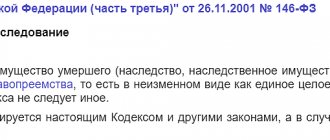What is joint ownership
Common joint ownership occurs when real estate is owned by several persons at once. The most common case of joint property is the purchase of an apartment during marriage. Premises that are the property of spouses are recognized as jointly owned and belong to each of them in equal parts.
During their lifetime, co-owners can use and own housing, but disposal (sale or gift) is allowed only with the consent of all owners. To carry out any actions with real estate, a power of attorney from the spouse is required. After the death of one of the owners, his share does not pass in full to the surviving spouse, but becomes an object that all legal successors can claim to inherit.
What to do if the inheritance was sold and other real estate was bought with these funds
Inherited property is considered the personal property of the new owner. He has the right to perform any actions with the object, including transactions:
- sales;
- exchange;
- donations.
The other party cannot dispose of the spouse’s property. Even the money received after the sale of the inheritance remains personal, i.e. They are not divided during a divorce. It does not matter whether the owner sold the property during the marriage or after it. The main thing is the status of the transaction object. Here the rules are similar to the donation process.
An exception is the introduction of significant improvements to the sold property. For example, the husband got an apartment, then the couple carried out renovations there using funds from the common budget. And the man sold the living space. The marital share will then be equal to the financial value of those improvements made previously.
If you purchased another property with those funds, everything is different:
- Purchased exclusively with the proceeds without additional payment - it will be the personal property of the heir.
- A better property was purchased; accordingly, the spouses made an additional payment from common money - part of the new apartment (or other property) is considered common. The one for which they paid extra.
If the spouse does not want to share, the other party will have to prove the fact of additional payment or improvements made in court.
Inheritance of common property
Acceptance of succession differs depending on the type of common property. If a specific part is allocated in kind, such property is recognized as shared property. The legal successors do not have any questions, since the actual parts of the housing of each spouse are known in advance. Then the heirs can only claim the property of the deceased.
If the rights are registered without determining the shares, the succession procedure becomes more complicated. Joint property does not include housing acquired before marriage, receiving it as a gift or inheritance. All other forms of title registered during the marriage make the property jointly owned. There are nuances of inheritance depending on whether the owner made official orders or not.
By will
Drawing up a will helps to avoid future disputes regarding inheritance issues. However, a citizen can only dispose of his part of the joint property in a document, bequeathing it to any persons. The disposition may display the specific share of each assignee. If they are not distributed in the document, the property belongs to all heirs equally.
The testator may not bequeath any part of the common dwelling to its co-owner. The surviving spouse remains the owner of his share, and the deceased will not be a participant in the division of half of the estate. For example, during his lifetime, a father left a will in which he indicated that he would bequeath his part of the apartment to his three sons. The wife of the deceased remains the owner of half of the living space, and each of the sons remains the owner of 1/6.
The notary acts in accordance with the law and does not have the right to influence the decision of the testator. If a co-owner does not agree with a will that does not give the surviving spouse rights to a share, he can apply to the court to file his claims to challenge the will. The deceased's order may be reviewed if there are compelling reasons for doing so.
In law
If the deceased did not make a declaration during his lifetime, his property will be divided among the heirs of the first degree. These include spouses, children and parents. If the deceased had no children or living parents, the joint property becomes the complete sole ownership of the person who was married to the deceased.
If there are relatives of the first degree, other than the wife or husband, then on a general basis they become participants in the case of division of property. For example, a will was not drawn up, and the testator, in addition to his wife, had two children and a mother. The distribution will look like this:
- the surviving spouse is the owner of his half of the apartment and ¼ of the part belonging to the deceased. Thus, the total share is 5/8 of the apartment;
- the children of the deceased and his mother each inherit 1/8 of the entire property.
All legal successors become owners of common joint property. At the same time, they have the right to dispose of these shares at their own discretion. Any transactions can be carried out only after registration of rights.
When is a section needed?
There is no need to allocate a share in an apartment acquired during marriage to one of the spouses during their lifetime. Even if the owner is the husband, the wife, according to the Civil Code, owns half. The need to divide property arises upon divorce or death of a husband or wife.
In the event of the death of a citizen, the spouse must contact a notary to obtain the right to his half. Applications from relatives are accepted only after the division of property between co-owners. In this case, only the property of the deceased spouse, which is included in the joint property, will be divided.
Successors have two options for determining shares:
- Drawing up an agreement between them in accordance with the agreement on the division of inheritance.
- Division of property after receiving a certificate of ownership.
The size of shares, conditions of ownership and other nuances of inheritance do not change depending on the moment when they were allocated. If property disputes arise, the parties should go to court.
Common property of spouses in the context of inheritance
Basic instructions on the procedure for inheritance and division of jointly acquired property are given by Article 1150 of the Civil Code (Civil Code of the Russian Federation). From the contents of part one, it follows that not only the personal property of the deceased husband (wife) is inherited, but also his part in the common assets.
At the same time, not long ago the law introduced the possibility for spouses to draw up one joint will for two. And it is allowed to provide for a different scheme for the distribution of inheritance.
By virtue of legal norms, jointly acquired property is everything acquired and earned by the family during the existence of the relationship. A fairly detailed list of assets is given in Art. 34 of the Family Code (RF IC). There is also personal property of spouses that stands apart.
According to Art. 38 of the RF IC, it is possible to divide property both during marriage and after its dissolution. By default, it is assumed that the shares of the husband and wife are equal. However, spouses have the right to sign a notarial agreement between themselves, which sets out a different scheme for the distribution of property.
How is joint property inherited?
The procedure for registering an inheritance for joint property is determined by law. The procedure for inheritance differs when there is a co-owner of the inherited property and sole property and consists in the need to allocate the share belonging to the surviving spouse.
The procedure may take longer and require the provision of additional documents. But following simple recommendations for taking possession of real estate makes the task easier and speeds up the process of dividing property and registering property rights.
What do we have to do
Persons who become owners of shares that are joint property must make a decision on the further disposal of their property. If the successor owners do not plan to live in the apartment with co-owners, they can sell their part of the housing.
The sale of shares is carried out both to co-owners and to strangers. However, the other owner has the first right to purchase. The seller makes an offer to sell in writing. By accepting it, the owner receives funds, and the co-owner of the apartment becomes the sole owner.
This sale option is preferable, since it is difficult to sell part of the home. Before carrying out transactions with inherited housing, legal successors are required to confirm their rights.
Procedure
The procedure for inheriting the share of a deceased spouse, which is included in joint property, is almost no different from inheritance on a general basis, with the exception of one nuance: after the death of a co-owner of the apartment, you must contact a notary to allocate part of the jointly acquired property. The sooner the owner declares his rights, the faster and easier the inheritance will be.
The order of succession is as follows:
- The heirs visit a notary to draw up a statement of their rights to the inheritance.
- Legal successors provide documents confirming kinship or close relationships with the deceased.
- Title documents for housing must be presented.
- The notary allocates the shares belonging to the legal successors.
- The notary issues a certificate of ownership.
- The heirs apply to Rosreestr or the MFC for state registration of housing and property rights to the apartment.
First-priority applicants are required to submit an application to a notary within six months from the date of death. The terms of circulation do not change if there is a will. The decision to draw up the testator's order does not affect its division between the spouses.
If the deadline for filing an application for inheritance has been missed, it can only be restored through a judicial procedure. This will require compelling reasons, for example, the heir did not know about the fact that the case was opened by a notary or had a good reason for failure to appear.
Documentation
Acceptance of an inheritance requires the preparation of documents with which the successor can apply to a notary. First of all, citizens need to draw up a statement indicating the personal data of all heirs and their degree of relationship with the deceased. The statement lists everything that is owned by the deceased person. The notary checks the number of property owners. Successors may indicate in the application a request to divide the inheritance into parts.
In addition to the application, legal successors provide:
- passports;
- documents proving the death of the owner;
- the deceased's title documents to the property;
- conclusion on the assessment of the cost of the apartment;
- will (if any);
- documents proving relationship with the deceased;
- a receipt for the state fee, which must be paid before contacting the notary.
The provision of a package of documents indicates the intention of the heirs to enter into property rights. After this, they wait for the issuance of certificates of ownership, which they must subsequently apply for state registration.
Finding out the fact of drawing up a will
The fact is that the principle of freedom of inheritance allows the testator in his will, which must be certified by a notary, to distribute shares in jointly acquired property, guided only by his will (see Articles 1118 - 1119 of the Civil Code of the Russian Federation).
This principle is somewhat limited only by the rule on the obligatory share in the inheritance, according to which the testator cannot deprive the inheritance of his children who have not reached the age of majority or are deprived of the ability to work, as well as a disabled spouse, parents and dependents recognized as disabled.
The mandatory share rule applies to all persons who are dependent on the testator and implies that all dependents in any case will receive at least half of the share that is due to each of them by law, regardless of what is written in the will. This is the so-called “obligatory share”, which includes all the property that the heir receives from the inheritance if there are grounds for this (Article 149 of the Civil Code of the Russian Federation).
Price
Entering into an inheritance is not a free procedure. You will have to pay state fees, expenses of the notary's office and services for assessing the value of property. If during the division of property any disputes arise and the parties have to go to court, the amount of expenses increases.
In addition to the funds spent on state fees, court costs and expenses for the services of representatives are added. In case of a peaceful resolution of the issue, it is necessary to pay the state fee and pay money for the work of the notary.
State duty
Payment of the state fee to the notary when entering into an inheritance is a mandatory condition. For close relatives of a deceased person, its size is 0.3% of the cost of the apartment received (or its share). There are restrictions on the maximum amount - no more than 100,000 rubles. For heirs of further order, the amount will increase to 0.6% and 1 million rubles. maximum.
In addition to paying for notary services, you will also have to pay for registering property with Rosreestr. The fee for this service is 200 rubles. If the heirs plan to cede their part in favor of the co-owner of the apartment, then it is more profitable not to declare their inheritance rights to the notary. This way you can save money on paying mandatory contributions.
Benefits for paying state fees are available to special categories of citizens who become property owners by will or by law - incapacitated persons (for example, disabled parents), young heirs, and disabled people. Also, an incomplete amount is paid by persons who lived with the deceased and relatives of persons who died as a result of the performance of public debt.
Nuances
The procedure for obtaining an inheritance of shared property has many features that may not arise during the process. Or significantly complicate the life of the heirs.
- 1st nuance : The notary is not obliged to notify applicants about the opening of an inheritance. He can do this if he is conducting an inheritance case and the testator has informed him in advance of the coordinates of the future heir.
- 2nd nuance : If the heir accepts the inheritance, he automatically becomes liable for the debts of the testator. It is impossible to accept the hereditary mass selectively.










